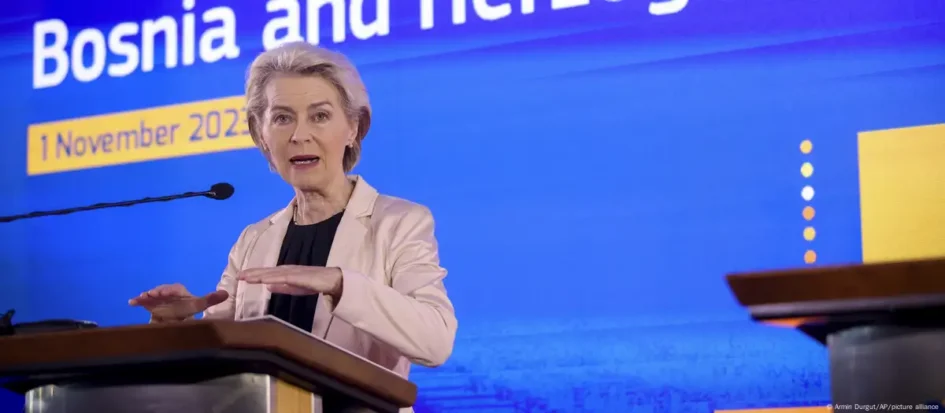
European Commission (EC) President Ursula von der Leyen’s visit to Bosnia and Herzegovina (BiH) on Tuesday (October 14) is part of her regional tour of the Western Balkans.
Ursula von der Leyen visited Tirana on Monday (October 13) and then traveled to Montenegro. From there, she will continue to Bosnia and Herzegovina. After talks with BiH officials, Von der Leyen will visit Serbia on Wednesday (October 15), before concluding her tour with visits to Kosovo and North Macedonia.
Von der Leyen’s visit to BiH comes after the BiH Council of Ministers adopted the Reform Agenda, a key document resulting from the Growth Plan for the Western Balkans. It was announced that the EC will assess the received Agenda, and after its coordination with the BiH authorities, it will be presented to the Council of the European Union (EU) and the European Parliament.
How to get EU funds?
BiH submitted the final version of the Reform Agenda to the European Commission on 30 September this year. This strategic document is a key prerequisite for accessing funds from the Western Balkans Growth Plan, an EU program estimated at six billion euros. This financial assistance, which is provided through grants and soft loans, is intended exclusively for countries that demonstrate their readiness to implement fundamental reforms in line with European standards.
The reform agenda precisely defines the measures that BiH needs to implement, including the responsibilities of institutions, deadlines, progress indicators and expected results. The structure of the Agenda, aligned with the EU Regulation, is divided into four thematic units: green and digital transition, business environment, human capital and rule of law.
Adnan Ćerimagić, Senior Analyst for the European Stability Initiative (ESI) for the Western Balkans, notes for DW that the EC President is coming to the region ahead of the publication of annual reports on the level of readiness for EU membership. “Since the EC has been publishing reports on BiH, since 2019, BiH has shown minimal progress. Given the current political crisis, I am not optimistic about this year’s report,” says Ćerimagić.
Reform Agenda and Transparency
When it comes to the Reform Agenda, the EC is currently reviewing its content, after which it will decide whether to accept it or whether it needs to be revised. “At this point, it is difficult to say what the response will be, because the details of the Reform Agenda, as well as the EC’s comments, have not been overly transparent so far. This especially applies to the reform of the Constitutional Court,” DW’s interlocutor points out.
Ćerimagić nevertheless emphasizes that the EC is taking into account the entire document (Agenda), which also contains positive solutions. He believes that, “if this ultimately results in the approval of money from EU funds for BiH, all citizens of BiH will benefit greatly – from expanding the capacity of preschool education, through better quality internet and mobile networks, to a more functional judiciary.”

Foto: Samir Huseinović/DW
Political messages, further conditions and regional review
“What will be the EC’s response to the BiH Reform Agenda is difficult to predict, but it is certain that the state-level coalition will be called upon to return to work at full capacity, in order to accelerate the fulfillment of the necessary conditions, including the appointment of the Chief Negotiator of BiH with the EU and the Coordinator for Pre-Accession Funds,” says the ESI analyst.
He also believes that, after the verdict of the Court of BiH against Milorad Dodik is respected, the EC President will send a political message to BiH ahead of the early elections for the President of the BiH entity Republika Srpska.
The focus of the EC President’s visit to the region, claims DW’s interlocutor, are Albania and Montenegro, which have made “significant progress, both in membership negotiations and in the implementation of the Reform Agenda”.
In addition to Bosnia and Herzegovina, Ćerimagić believes that “both Kosovo, which still does not have a government, and Serbia, which promises reforms but does not fulfill them, are problematic”.
Media question
The International Press Institute announced that the Media Freedom Coalition and journalist organizations have called on the EC President to pay special attention to the crisis of media freedom during her visit to the Western Balkans.
As reported by Free Europe, the Institute states that partner organizations have recorded “exceptional pressures” in the region since October last year. As examples, it singles out “the sudden shutdown of Al Jazeera Balkans, the intensification of political pressure on N1 and Nova TV channels, and the launch of a television channel by the Kremlin propaganda outlet RT Balkans”, assessing that the above represents “existential threats to independent journalism”.
Borka Rudić, Secretary General of the Association of BH Journalists, expects that EC President Ursula von der Leyen will send a clear message to officials in BiH, as well as in other countries in the region, that “without progress in protecting media freedoms and the safety of journalists, there will be no progress in EU integration.”
She emphasizes that it is “unacceptable that media freedoms have drastically declined after BiH received candidate status.” This decline, according to the RSF (Reporters Without Borders) Index, amounted to 23 places in the last two years.
Rudić also points out the unacceptable level of impunity for violence: “It is unacceptable that only 25.4% of cases of attacks and threats against journalists and media workers in BiH are resolved in favor of the journalists and with the attackers punished. Such a level of impunity for violence against journalists is certainly not possible in any EU country!”

Foto: Samir Huseinović/DW
A special problem – the criminalization of defamation
In her opinion, the significant decline in media freedoms has been contributed to by the criminalization of charges for alleged defamation and the adoption of other legal solutions that do not follow EU standards. She believes that these are all issues that von der Leyen should discuss with local leaders: “It should not happen that media freedoms and the safety of journalists are overshadowed by some other ‘more important’ political or economic issues during this visit.”
The BH Journalists Association expects a clear message from the EC President that the European institutions will “do much more and demand more vigorously” from the BiH leaders to apply European standards, media freedoms and the safety of journalists in the local legal and institutional system.
Finally, Rudić concludes that “it is high time that we have a clear, fair, comprehensive and transparent policy and measures that the EC and EU delegations in the region intend to take in this and next year.”
Source: DW
Photo: Armin Durgut/AP/picture alliance



